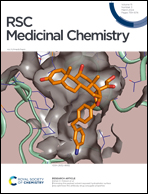Deconvoluting low yield from weak potency in direct-to-biology workflows with machine learning†
Abstract
High throughput and rapid biological evaluation of small molecules is an essential factor in drug discovery and development. Direct-to-biology (D2B), whereby compound purification is foregone, has emerged as a viable technique in time efficient screening, specifically for PROTAC design and biological evaluation. However, one notable limitation is the prerequisite of high yielding reactions to ensure the desired compound is indeed the compound responsible for biological activity. Herein, we report a machine learning based yield-assay deconfounder capable of deconvoluting low yield from low potency to identify false negatives. We validated this approach by identifying promising SARS-CoV-2 main protease inhibitors with nanomolar activity that rivaled potency observed from the standard D2B workflow. Furthermore, we show how our framework can be utilized in a broad, in silico screen to produce compounds of similar potency as a D2B assay.

- This article is part of the themed collection: AI in Medicinal Chemistry


 Please wait while we load your content...
Please wait while we load your content...